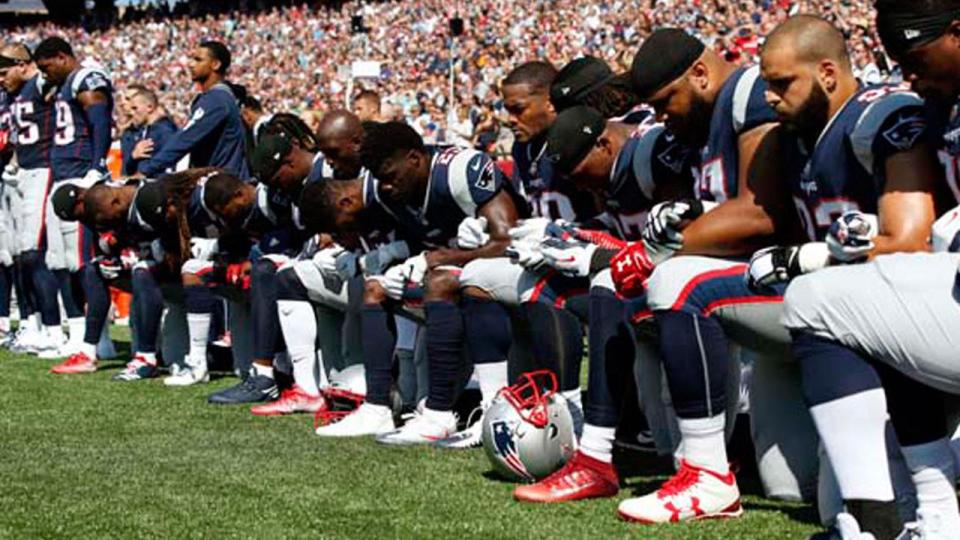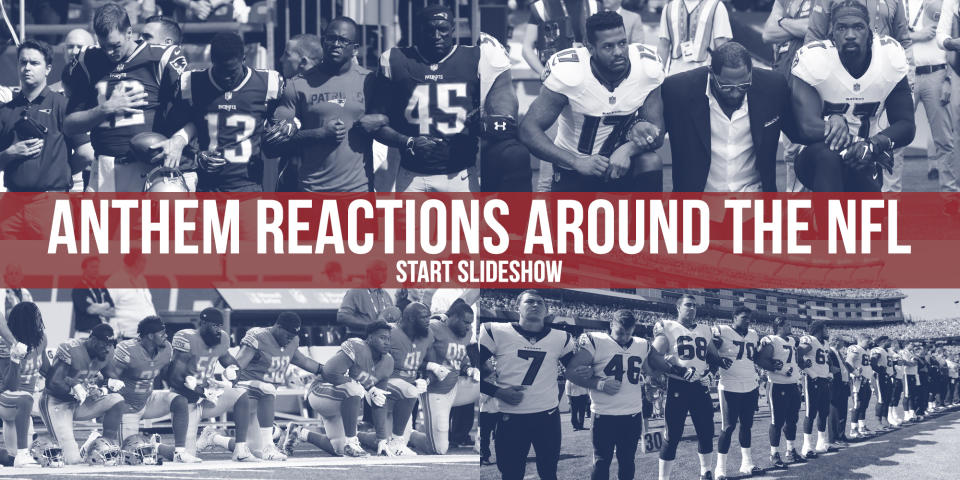NFL protests during the national anthem, explained
Protests during the national anthem dominated the NFL on Week 3 Sunday. Here’s a rundown of what’s happened and why.
When did the anthem protests begin?
Former San Francisco 49ers quarterback Colin Kaepernick began kneeling during the national anthem during the 2016 preseason. Since then, other players have joined him in some form of protest, either kneeling or sitting, including notables such as the Seattle Seahawks’ Michael Bennett.

Why are the protests happening?
Kaepernick began his protest to draw attention to racial injustice and police brutality. Bennett has said on several instances that he has sought to promote social equality, using his anthem stance to draw attention to his cause. The players have stressed that they love America and want it to be a stronger, more inclusive country.
Are the players criticizing the military?
The players who have spoken to the media about their protests have taken pains to emphasize that their protests are not aimed at disrespecting the military’s service. Symbols and anthems hold different meanings for different people, with some fans saying the anthem is a symbol of military sacrifice, and others saying the anthem honors the right to differing opinions. But while many fans have taken offense to the players’ protests, the players themselves have made it clear their statements are not aimed at the military.
Why are so many protests happening today?
On Friday night, President Trump called out players who kneel during the anthem, saying any “son of a bitch” who kneels ought to be fired. That didn’t sit well with either players or team owners in the league. The players clapped back at the president on Twitter, and teams issued statements supporting their players’ right to speak their minds peacefully. That enraged Trump, who blasted the NFL and its owners on both Saturday and Sunday. So Trump, by criticizing both the NFL and its players, managed to bring both owners and players together, and also managed to spark the protests to unheard-of levels.
Why do they have to protest during games? Why can’t they do it some other place?
The entire point of a protest is to cause discomfort, to force a change in the status quo without inciting violence, whether it’s a march or a sit-in or kneeling during an anthem. A player holding a protest in his kitchen isn’t going to draw the same attention to his cause as a player protesting before a nationally televised football game. And as we saw last month in Charlottesville, Virginia, there are far more devastating ways that a protest can go than simply taking a knee during the anthem.
Why can’t players who make millions be satisfied with that? Why can’t they stick to sports?
Because they’re human beings, who have opinions beyond wanting to win football games. Also, many wish to use their fame to create some positive change, and because in 2017, politics have touched every corner of our lives, like it or not.
Are protests causing the NFL’s drop in ratings?
Definitely. But the question of how much is open to broad interpretation. Polls have shown that as many as half of the NFL’s fans are opposed to the protests. But ratings have only fallen — when they’ve fallen; some games are way up — by a much smaller margin than that. And there are other factors to consider, including other entertainment options, dull games, hurricane coverage, and the like. Surely some fans have given up on the NFL, but it’s impossible to measure their specific impact on the decline in ratings.
What about the players’ right to free speech?
This is a key point that’s often misunderstood on the Internet: free speech isn’t freedom from consequences. Players are free to say what they want, but they can suffer consequences from that, including booing, loss of sponsors, even loss of a job.
“Free speech” only protects you from government intervention. Now, Trump’s comments about how the players ought to be fired starts to bump up against free speech protections … but absent that, the players can say what they wish, when they wish and must accept the consequences.
Can the owners fire the players for protesting?
In theory, team owners could fire players for anything they wish. In practice, it’s a lot more complicated than that. For starters, players under contract would be owed the balance of their contract, which can stretch for years. Plus, “kneeling during the anthem,” while it may be infuriating to fans, may not rise to the level of conduct that warrants dismissal under NFL union agreements … and particularly not now that several owners have issued statements supporting their players’ right to free speech or linked arms in solidarity with their players on the sideline. Regardless of the president’s demands, simply “firing” a player for kneeling would be an invitation for a lawsuit, intervention from the players’ union, and years of headaches for little guarantee of a positive result. You thought deflate-gate was bad? Imagine how bad Kneelgate would be.
What comes next after protests?
That’s the big question, isn’t it? Kaepernick has already donated nearly a million dollars to various charitable causes. And other players have undertaken similar outreach efforts, with more hopefully in the works. Four current and former players have asked commissioner Roger Goodell for his assistance in helping further their goals of racial equality. It’d be a shame to waste all the unity created this weekend.
____
Jay Busbee is a writer for Yahoo Sports and the author of EARNHARDT NATION, on sale now at Amazon or wherever books are sold. Contact him at jay.busbee@yahoo.com or find him on Twitter or on Facebook.

 Yahoo Sports
Yahoo Sports 

